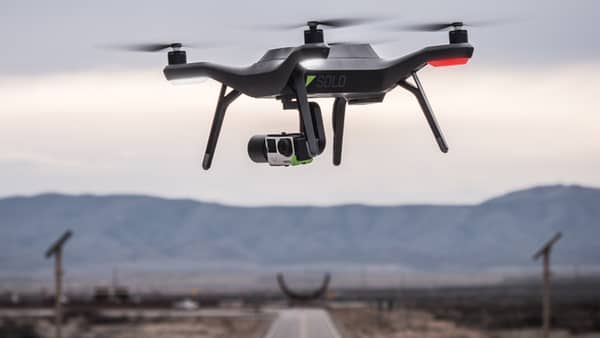
Robohub.org
The Drone Center’s Weekly Roundup: 8/29/16
August 22, 2016 – August 28, 2016
News
A U.S. drone strike in Yemen reportedly killed five suspected members of al-Qaeda. According to witnesses who spoke to the Associated Press, the strike targeted a vehicle traveling in Yemen’s southern Shabwa province.
The Defense Science Board made 26 recommendations to the Department of Defense aimed at advancing the development of autonomy in weapons systems. In a report released publicly last week, the DSB expressed concern that the United States could fall behind other countries in the fielding of autonomous weapons. The study’s authors emphasize that the military must “move more rapidly to realize” the value of autonomy. (Defense One)
A Virginia woman shot down a drone that was reportedly flying over her neighbor’s property. Fox 5 reported that Jennifer Youngman was sitting on her porch cleaning her shotgun when she saw the drone appear overhead and decided to take action against it.
The Electronic Privacy Information Center filed suit against the Federal Aviation Administration for failing to include enough privacy safeguards in the Part 107 rules for non-recreational drone use. EPIC argues that the 2012 FAA Modernization and Reform Act requires the FAA to integrate privacy protections into its drone regulations. (Law360)
The U.S. Department of State is reportedly exploring the possibility of establishing international norms on military drone exports. According to Defense News, the State Department delegation to the Arms Trade Treaty in Geneva is encouraging international allies to sign on to a document that would require the human rights and transparency policies of the weapon systems buyer to be taken into account before a sale is made.
Commentary, Analysis and Art
In the August edition of Air Force Magazine, Will Skowronski examines the state of the U.S. MQ-9 Reaper force.
At Vocative, Allee Manning and Tal Reznik take find out which U.S. cities are drawing drone businesses and hobbyists.
At Buzzfeed, Sarah A. Topol examines efforts by several groups to stop the development of lethal autonomous weapons.
At Defense News, David Larter reports that the Navy is determined to turn the Stingray drone into an aerial refueler.
At Daily Nation, Gerald Andae examines the growth in the number of applications for commercial drone permits in Kenya.
Researchers at RMIT University in Melbourne, Australia studied 150 civilian drone-related accidents and concluded that most were caused by technical issues rather than pilot error. (ABC)
At the University of St. Gallen, Prof. Dr. Isabelle Wildhaber compares drone regulations in Europe and the U.S.
At CNBC, Arriana McLymore profiles Verifly, a mobile app that offers insurance for drones.
At Lawfare, Charles Kels writes that the Presidential Policy Guidance on drone strikes “reads more like a departmental instruction for routing an award ‘nomination package’ than a primer for combat.”
At War on the Rocks, Jules Hurst argues that an “autonomous arms race has begun.”
At the Bulletin of Atomic Scientists, Julia M. Macdonald and Jacquelyn G. Schneider consider why the U.S. public largely approves of the use of military drones.
At Geographical Imaginations, Derek Gregory examines the parallels between military drones and casino gaming.
At the Motley Fool, Rich Smith looks as the competition between AeroVironment and Elbit Systems for Navy contracts for small reconnaissance drones.
At Spar 3D, William Tompkinson examines how consumer drones could cost more over the long term than one would expect.
At the Sunday Times, Catherine Sanz writes that the U.K. Ministry of Defence has spent €3.67 million on small drones since 2007.
A handmade rug by artist Jim Ricks depicting the “Drone Survival Guide” is on display at the Ulster Museum in Northern Ireland. (The Creators Project)
Know Your Drone
A study published by the Royal Society suggests that the flight habits of seagulls could shed light on the best way to plan for cities filled with drones. (The Conversation)
U.S. startup Aptonomy Inc. has developed a system that enables multirotor drones to be used as autonomous low-flying aerial security guards. (TechCrunch)
Iran’s Ministry of Defense unveiled a vertical take-off and landing drone designed for photogrammetry. (Mehr News Agency)
Bloomberg examines various Pentagon initiatives to counter explosive-laden drones.
Consumer drone maker Parrot has unveiled a new version of the Disco, a fixed-wing hobby drone that comes with a first-person view video transmission system. (CNET)
A team at Harvard University has developed a robotic octopus made entirely out of non-rigid components. (NPR)
Chinese drone maker PowerVision unveiled the PowerEgg, an egg-shaped consumer quadcopter. (Engadget)
A team of researchers from Clemson University and Carnegie Mellon University are developing systems to use unmanned vehicles for crop testing as part of a program to produce sustainable energy crops. (Phys.org)
Disney has been awarded a patent for a drone that can be used to discharge fireworks, confetti, and artificial snow. (Orlando Business Journal)
Drones at Work
The Connecticut Department of Transportation is testing drones for bridge inspection operations. (Government Technology)
The Pakistani government is reportedly considering using drones for surveillance along the China-Pakistan Economic Corridor. (Dunya News)
The Greater Cincinnati Water Works in Ohio has purchased two drones, but will not use them until the city government develops policies to govern their use. (Cincinnati.com)
“Drones for Refugees,” a non-profit founded by a former Afghan refugee, seeks to use drones to find migrant boats that are stranded in the Mediterranean. (Business Insider)
The Kentucky University Jayhawks football team has acquired a drone to film practice sessions from the air. (KU Sports)
Business Insider claims that it has discovered the secret location in the U.K. that Amazon is using to test its Prime Air drone delivery system.
Russia’s Western Military District established a specialized drone unit to operate various kinds of unmanned aerial systems. (Press Release)
Pizza chain Domino’s has been granted permission to test a pizza drone delivery system in New Zealand. (New Zealand Herald)
The City Council of Menlo Park in California’s Silicon Valley has passed an ordinance banning drones from the city’s parks. (The Mercury News)
Meanwhile, the Franklin Lakes Borough Council in New Jersey approved an ordinance that restricts the use of drones during daylight hours over private property without the owner’s permission. (North Jersey)
A team from the University of Alaska Fairbanks deployed a drone to assist in the search for a missing 11-year-old boy. (Newsminer)
Drone maker DJI and the World Rally Championship have partnered to provide aerial coverage of rally races. (Top Gear)
The Maharashtra government in India used drones to monitor traffic along the Pune-Mumbai Expressway and identify drivers engaged in traffic violations. (Indian Express)
Rescue workers used drones to survey damage caused by the recent 6.2 magnitude earthquake in Italy. (CNN)
A team of Parks Canada underwater archaeologists is using drones to assist in the search for the HMS Terror, a 19th century ship that sunk in the Northwest Passage. (Motherboard)
Australian startup Freedom Drone Racing is seeking to create a drone racing series featuring large, powerful drones capable of flying at speeds of up to 120 mph. (Gizmodo)
A North Carolina man used a drone to help law enforcement officers find a lost kayaker. (WECT)
The New Zealand Fire Service is trialling drones for a variety of applications, including search-and-rescue and firefighting operations. (News Hub)
Energy firm Xcel Energy is testing large Hermes 450 drones to collect aerial data during major blackouts and other emergencies. (San Francisco Chronicle)
Industry Intel
The U.S. Navy awarded NAVMAR Applied Sciences Corp. a $12.4 million contract that includes funding for research of a low-cost surveillance and reconnaissance drone. (Contract Announcement)
News24 reports that the Nigerian government is seeking to replace its Chinese CH-3A drones with Yabhon 20 unmanned aircraft from the United Arab Emirates.
FlightGlobal reports that Israel has agreed to supply Kazakhstan with an unknown number of drones.
Meanwhile, RADA Electronic Industries, an Israeli defense electronics firm, will supply an unspecified country in Asia with the RPS-42 tactical radar system for countering drones. (IHS Jane’s 360)
Raytheon was awarded a $104 million contract to modernize the U.S. Air Force’s RQ-4 Global Hawk ground control stations. (Press Release)
Kratos Defense and Security Solutions, Inc. partnered with Robonic Ltd Oy, a Finnish company, to deliver third-generation drone launchers to the U.S. Army. (Press Release)
Boeing Insitu won a $14.2 million contract for RQ-21A Blackjack systems for the Canadian Army. (Ottawa Citizen)
The Department of Defense awarded Drone Aviation Holding Corp. a $125,000 contract to integrate sensors aboard the Winch Aerostat Small Platform. (Unmanned Systems Technology)
DroneDeploy, a startup software company, raised $20 million in Series B funding to create detailed maps using aerial data from drones. (Fortune)
PRENAV raised $6.5 million in seed financing to develop drones for infrastructure inspections. (Windpower Engineering and Development)
The U.S. Department of the Interior awarded 3DR a $256,000 contract for up to 40 Solo quadrotor drones. (AIN Online)
For updates, news, and commentary, follow us on Twitter. The Weekly Drone Roundup is a newsletter from the Center for the Study of the Drone. It covers news, commentary, analysis and technology from the drone world. You can subscribe to the Roundup here.
tags: c-Aerial, Center for Drone News, Center for the Study of the Drone at Bard College, weekly drone roundup






